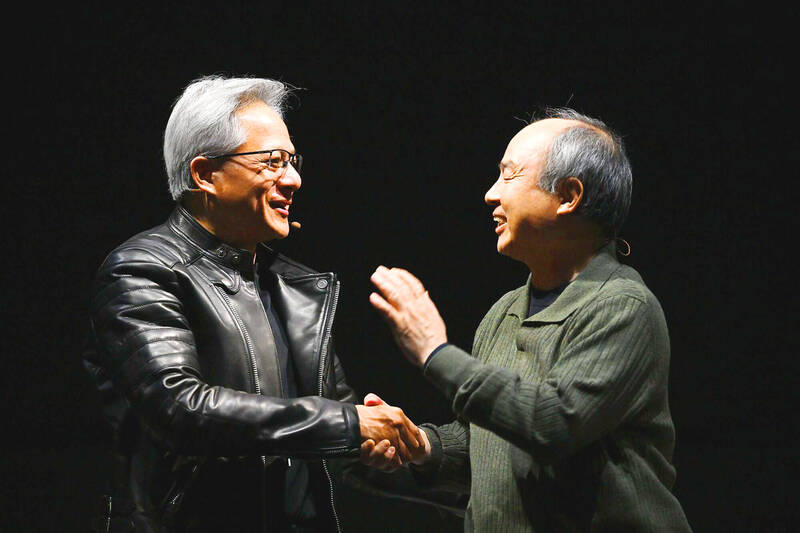Softbank Group Corp would be the first to build a supercomputer with chips using Nvidia Corp’s new Blackwell design, a demonstration of the Japanese company’s ambitions to catch up on artificial intelligence (AI).
The group’s telecom unit, Softbank Corp, plans to build Japan’s most powerful AI supercomputer to support local services, it said.
That computer would be based on Nvidia’s DGX B200 product, which combines computer processors with so-called AI accelerator chips.

Photo: Bloomberg
A follow-up effort will feature Grace Blackwell, a more advanced version, the company said.
The announcement indicates that Softbank Group, which until early 2019 owned 4.9 percent of Nvidia, has secured a favorable spot in line for the AI chips.
Softbank Group founder Masayoshi Son has said he is preparing to “swing for the fences” in AI bets.
The company on Tuesday reported a return to profitability on rising tech valuations.
Son joined Nvidia chief executive officer Jensen Huang (黃仁勳) on stage in Tokyo during Nvidia’s AI Summit yesterday.
When reminded of Softbank Group’s prior Nvidia stake — which would be worth about US$178 billion today — Son cringed and laughed, then wrapped Huang in a bear hug.
Nvidia has been crisscrossing the globe to host such events, promoting what it calls the new industrial revolution. Events in India and now Japan are aimed at broadening the deployment of AI systems to nation-based efforts and lessening Nvidia’s reliance on a few large US customers.
In addition to the new computer and the plan for a second, Softbank Group’s telecom unit would also use Nvidia gear to provide AI services over cellular networks. Traditional hardware, based on custom chips that are designed to maximize mobile data traffic, is not optimal for new AI services.
“What will result is an AI grid that runs across Japan,” Huang said, adding that this would change the communications network into an AI network.
New AI radio access networks, would be better-suited to remote robotics, autonomous vehicle support and powering other services, Huang said.
They would also require less electricity, he added.
The telecom unit would begin testing the network with partners Fujitsu Ltd and International Business Machines Corp’s Red Hat Inc.
“We are going to buy a lot of your chip,” Son told Huang.
Japan is on the cusp of change, said Son, who has often criticized both the country’s government and companies for their slowness in adopting new technologies.
This time, the Japanese government is not getting in the way of a buildout in AI and robotics, he said.
The Japanese government has allocated ¥4 trillion (US$26 billion) to bolster its domestic chip production capacity. That includes a moonshot project behind Rapidus Corp to build a state-of-the-art foundry from scratch to challenge Taiwan Semiconductor Manufacturing Co (台積電), which manufactures Nvidia chips. Japanese Prime Minister Shigeru Ishiba has also pledged more than US$65 billion of fresh support for the nation’s semiconductor and AI sectors.
“But they should encourage more,” Son told Huang. “As you say, this is the reset, this is the catch-up moment for this revolution. We can’t miss this time.”

Vincent Wei led fellow Singaporean farmers around an empty Malaysian plot, laying out plans for a greenhouse and rows of leafy vegetables. What he pitched was not just space for crops, but a lifeline for growers struggling to make ends meet in a city-state with high prices and little vacant land. The future agriculture hub is part of a joint special economic zone launched last year by the two neighbors, expected to cost US$123 million and produce 10,000 tonnes of fresh produce annually. It is attracting Singaporean farmers with promises of cheaper land, labor and energy just over the border.

US actor Matthew McConaughey has filed recordings of his image and voice with US patent authorities to protect them from unauthorized usage by artificial intelligence (AI) platforms, a representative said earlier this week. Several video clips and audio recordings were registered by the commercial arm of the Just Keep Livin’ Foundation, a non-profit created by the Oscar-winning actor and his wife, Camila, according to the US Patent and Trademark Office database. Many artists are increasingly concerned about the uncontrolled use of their image via generative AI since the rollout of ChatGPT and other AI-powered tools. Several US states have adopted

A proposed billionaires’ tax in California has ignited a political uproar in Silicon Valley, with tech titans threatening to leave the state while California Governor Gavin Newsom of the Democratic Party maneuvers to defeat a levy that he fears would lead to an exodus of wealth. A technology mecca, California has more billionaires than any other US state — a few hundred, by some estimates. About half its personal income tax revenue, a financial backbone in the nearly US$350 billion budget, comes from the top 1 percent of earners. A large healthcare union is attempting to place a proposal before

KEEPING UP: The acquisition of a cleanroom in Taiwan would enable Micron to increase production in a market where demand continues to outpace supply, a Micron official said Micron Technology Inc has signed a letter of intent to buy a fabrication site in Taiwan from Powerchip Semiconductor Manufacturing Corp (力積電) for US$1.8 billion to expand its production of memory chips. Micron would take control of the P5 site in Miaoli County’s Tongluo Township (銅鑼) and plans to ramp up DRAM production in phases after the transaction closes in the second quarter, the company said in a statement on Saturday. The acquisition includes an existing 12 inch fab cleanroom of 27,871m2 and would further position Micron to address growing global demand for memory solutions, the company said. Micron expects the transaction to